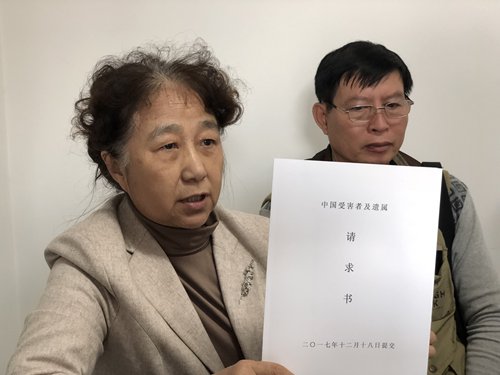
Chen Liancun, 91, a Chinese "comfort woman," weeps as she tells her story of being forced into sex slavery by the Japanese Imperial Army during World War II on Thursday in Beijing. (Photo: Bai Tiantian/GT)
Chinese "comfort women" and their relatives are asking the Chinese government to exercise its right of diplomatic protection to help victims seek an official apology from Japan. Five surviving Chinese "comfort women" and 12 relatives of the deceased female victims of Japan's wartime military brothels submitted a petition to the Foreign Ministry, said their attorney Kang Jian on Thursday.
This is the first time that Chinese World War II victims have resorted to diplomatic protection rights to demand an apology and compensation from Japan.
Guan Jianqiang, a law professor at the East China University of Political Science and Law, said invoking diplomatic protection means would allow China to directly engage in negotiation with Japan on behalf of its citizens and also to file a lawsuit in the international court.
Guan told the Global Times that Chinese "comfort women" had exhausted all possible legal avenues in Japan and could not yet find a resolution, which is what pushed them to petition for diplomatic protection.
In 2007, Japan's Supreme Court rejected appeals from Chinese "comfort women" groups, ruling that the 1972 Japan-China Joint Communique bars Chinese individuals from seeking war compensation through the court.
Chen Liancun, 91, a "comfort woman" from South China's Hainan Province, told the Global Times on Thursday at a press conference in Beijing that she would fight till her last breath for an apology from the Japanese government.
Chen, was raped by three Japanese soldiers when she was only 13 while forced to serve as a "comfort woman" for the Japanese imperial army at their stronghold in South China's Hainan Province.
The other surviving "comfort women" who filed the petition are Wei Shaolan, 93, Tang Genzhen, 97, Liu Cizhen, 89, and Zhuo Tianmei, 92.
Su Zhiliang, a professor at Shanghai Normal University who studies "comfort women," said that the sex slavery was a crime committed not only by Japanese individuals but by the Japanese government and its military.



















































